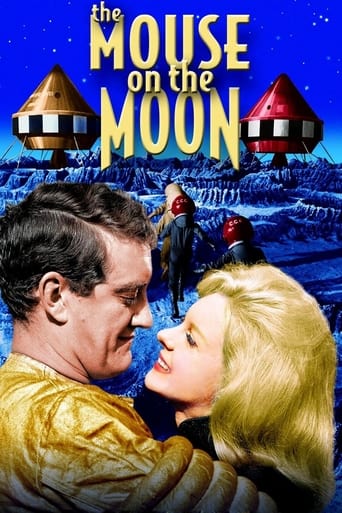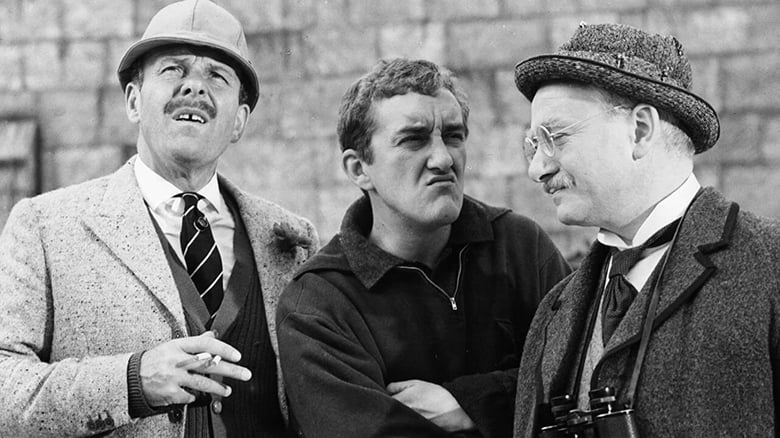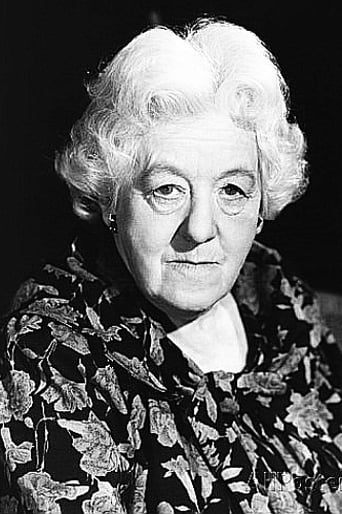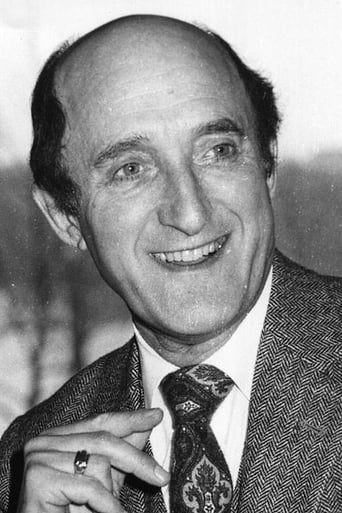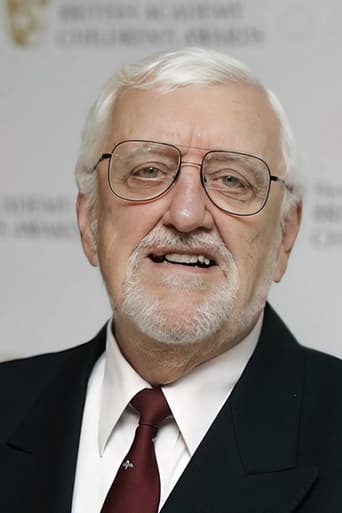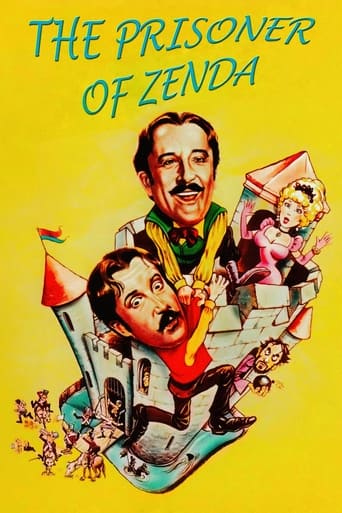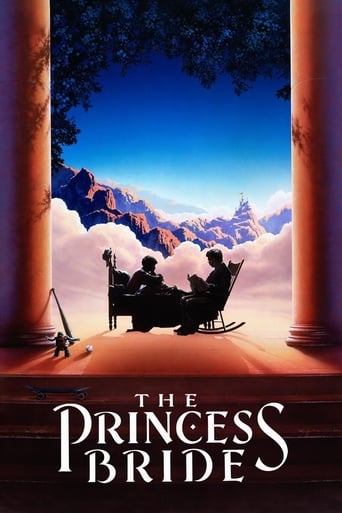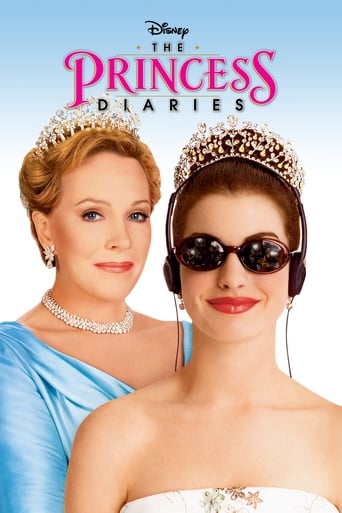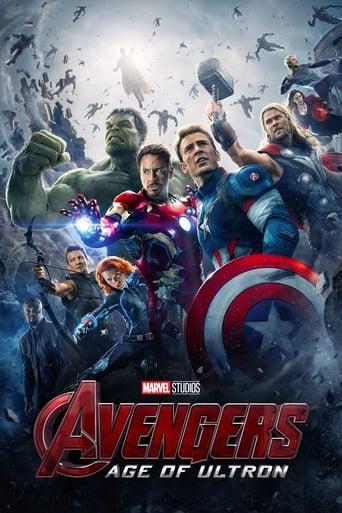The Mouse on the Moon (1963)
Sequel to The Mouse that Roared; The Tiny Country of Grand Fenwick has a hot water problem in the castle. To get the money necessary to put in a new set of plumbing, they request foreign aid from the U.S. for Space Research. The Russians then send aid as well to show that they too are for the internationalization of space. While the grand Duke is dreaming of hot baths, their one scientist is slapping together a rocket. The U.S. and Soviets get wind of the impending launch and try and beat them to the moon.
Watch Trailer
Cast
Similar titles
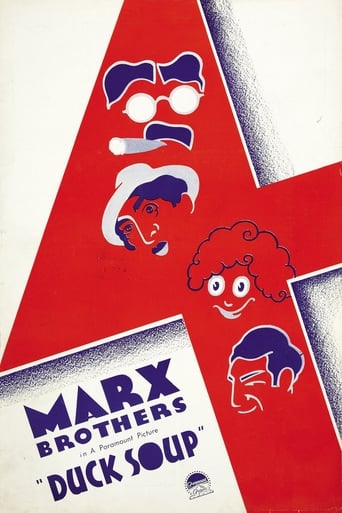
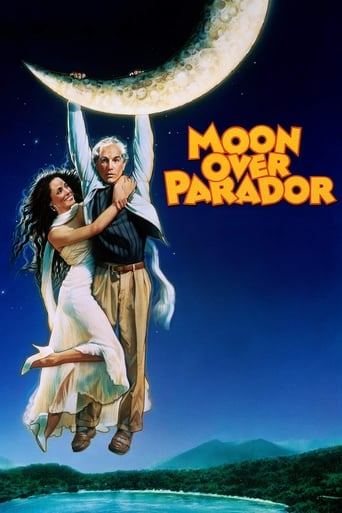
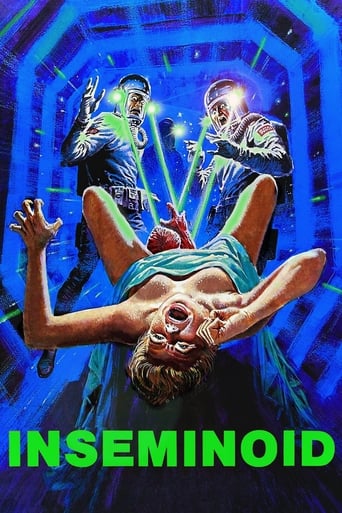
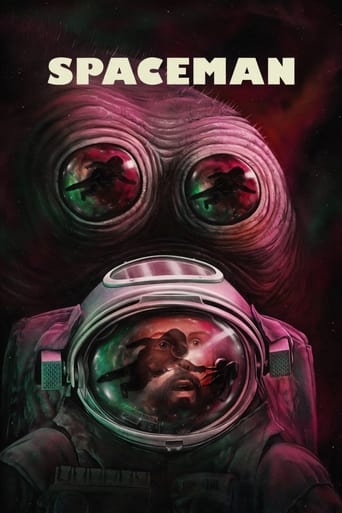
Reviews
You won't be disappointed!
One of my all time favorites.
I wanted to like it more than I actually did... But much of the humor totally escaped me and I walked out only mildly impressed.
This is a coming of age storyline that you've seen in one form or another for decades. It takes a truly unique voice to make yet another one worth watching.
"The Mouse on the Moon" is a comedy satire and sci-fi film that is quite dated and has lost much of its appeal over time. It is one of two movies based on a series of novels by Irish-American author, Leonard Wibberley. The first, "The Mouse that Roared" was a 1955 novel that was made into the smash hit movie of the same title by Columbia Pictures in 1959. Peter Sellers starred in three roles in that film. This second film is from the third novel of the "Mouse" series, also by the same title. It was published in 1962. The mouse refers to the smallest country in the world, the fictitious Grand Duchy of Fenwick. Land-locked somewhere in the middle of Europe, Fenwick has continued its cherished customs based on its English heritage. This film enjoyed success at the time, but its plot was considerably dated to the period of a single decade. Among other drawbacks from the original are a far inferior screenplay and fewer big name stars in the cast. The setting was the space race during the Cold War that pitted the U.S. against the Soviet Union. Russia scored first when Cosmonaut Yuri Gagarin became the first person to travel in space. On April 12, 1961, he orbited the earth in Vostok 1. The U.S. scored second with the first man on the moon in 1969. Neil Armstrong left earth in Apollo 11 on July 16 with Edwin Aldrin and Michael Collins. On July 20, Armstrong and Aldrin landed on the moon, and Armstrong became the first human to set foot on the moon.Since then, the space race has ended, and modern space exploration is done by several nations, most often in cooperative ventures. But, for 1963 the space race was a hot item. So, this film naturally had more interest. The script milks it as much as possible. But, only mildly funny in places then, the script doesn't hold as much interest among audiences in the 21st century. Here's a sample line of humor from the film. Maurice Spender (played by Terry-Thomas), "I read your letter in the Times. Rushed over here post-haste." Professor Kokintz (played by David Kossoff), "How nice." Maurice Spender, "I say. I'm extremely excited to see those Botherbinks." Professor Kokintz, "Botherbinks? Bobolinks." Maurice Spender, "No, that's what I said, didn't I? Bob... bob... bobolinks."
"The Mouse That Roared" put a comedic spin on the United States' policy of rebuilding those countries it has beaten in war. Here in the sequel, the subject is the space race and the international contest concerning putting a man on the moon. As in the original film, the small duchy of Grand Fenwick is faltering financially and needs the aid of other countries to make ends meet. (It never occurs to anyone to sell off some of the jewels dripping off their ruler, The Grand Duchess!) The Prime Minister (Moody) concocts a scheme to trick the U.S. into providing funds for rocket research which he actually intends to use for installing indoor plumbing at the castle (due to his fondness for long baths which, initially, don't include hot water!) Once the U.S. coughs up some money, the U.S.S.R., not to be outdone, provides Grand Fenwick with a rocket, though neither country believes that any true result will come of their deeds. When Moody's son Cribbins comes back home from school, he decides to actually give space travel a go, with the help of a grandfatherly professor (Kossoff.) Meanwhile, the dotty Duchess (Rutherford) engages in various pageantry and the duchy's youth live as protesting Beatniks (!) led by Richie. Much of this satire will be lost to a newer generation since so much has changed since the time it was made. This was filmed before the Kennedy assassination and the breaking of many social and sexual taboos across the world. If anything, it presents a sort of periodic time capsule of the socio political climate of the day. Director Lester shows signs of the rather subtle slapstick and physical comedy that he would insert into many of his later films. Top-billed Rutherford (right at the height of her popularity in the Miss Marple films) is given almost nothing to do. Always engaging to watch, she nonetheless has very little of interest to work with and is off screen for much of the picture. Moody gives a solid and energetic performance, though his biggest hit would follow in a few years with "Oliver!" Cribbins is only moderately entertaining and lacks the charisma to really grab attention. The ever-exasperated Thomas shows up briefly as a U.K. spy and adds some sparkle to the proceedings. Richie has a thankless, idiotic role and an even more thankless wardrobe. It's worth a look for fans of Moody, Lester and films concerning The Cold War and earlier U.S. mores, but doesn't really succeed as a full-on comedy. Most of the humor is very dry and spotty. Fans of physical comedy may find more to laugh at during the various mishaps of the cast. For many folks, the absence of Peter Sellers (star of the original film in three separate roles) relegates this to a misfire. It's not a bad little film, it's just not a great one.
The Mouse That Roared was an amazingly original and funny movie. This follow-up picture tries to capture the magic of the first but just can't. The ideas that made the original movie so different now just seem silly in this sequel.The biggest problem, for me, is that Peter Sellars who was SO IMPORTANT to the original (playing a multitude of roles) isn't in this movie and so there are NO familiar faces. Margaret Rutherford is now the queen (and Peter Sellars made a much prettier queen), and Ron Moody and so many others take on most of the other roles from the original.My attitude is that if you CAN'T get the original cast, don't bother. This is a fair movie but can't hold a candle to the original.
It's hard for it not to pale in comparison to its predecessor, "The Mouse That Roared," but "The Mouse on the Moon" is still an amiable enough comedy that it overcomes its own slightness and miniscule budget. The plot -- which concerns the Duchy of Grand Fenwick petitioning the United States for a loan so that it can develop a space program (which is really a cover for the prime minister's insatiable desire for indoor plumbing) -- is amusing and gives director Richard Lester and screenwriter Michael Pertwee plenty of opportunities to draw parallels between the Americans and the Russians as they scramble to beat the tiny country to the moon.Instead of Peter Sellers in three roles, we have Margaret Rutherford taking over one (as the dotty grand duchess) and Ron Moody taking over another (as the ruthless prime minister). Both are funny enough, but they're no substitute for the real thing. Joining them are a young Bernard Cribbens as Moody's son Vincent, who wants nothing more than to be an astronaut, David Kossoff (one of four actors returning from "The Mouse That Roared") as the ever resourceful Professor Kokintz, and Terry-Thomas as a thoroughly inept British spy. Also watch for John Bluthal in his first of many films for Lester as Von Noldol, the enthusiastic German scientist working for the U.S.For Richard Lester fans, this is a must-see. After all, this is the film that got him the job directing a certain film starring four lads from Liverpool...
